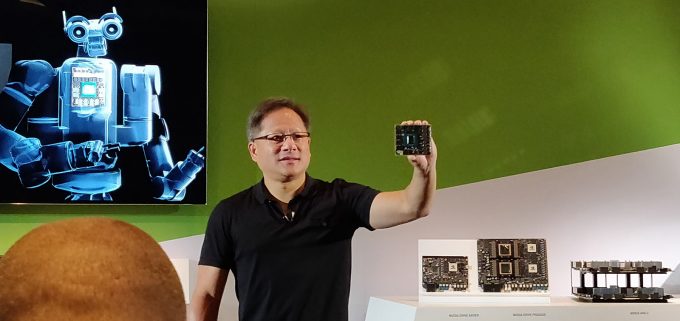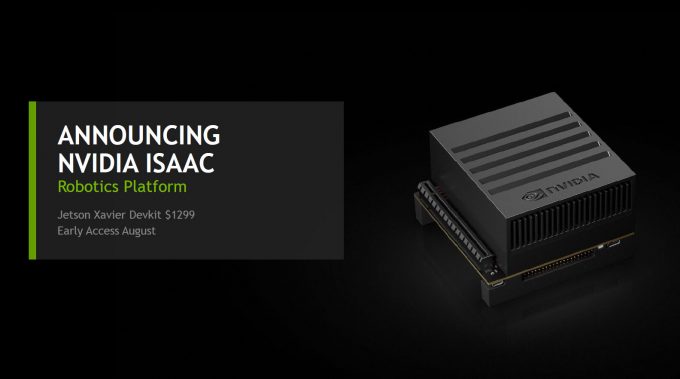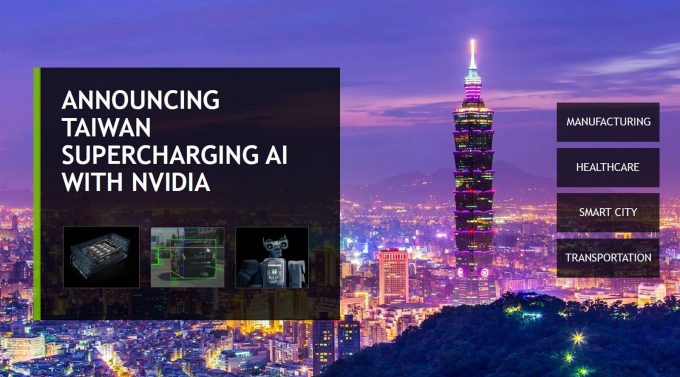- Qualcomm Launches Snapdragon 4 Gen 2 Mobile Platform
- AMD Launches Ryzen PRO 7000 Series Mobile & Desktop Platform
- Intel Launches Sleek Single-Slot Arc Pro A60 Workstation Graphics Card
- NVIDIA Announces Latest Ada Lovelace Additions: GeForce RTX 4060 Ti & RTX 4060
- Maxon Redshift With AMD Radeon GPU Rendering Support Now Available
NVIDIA Announces ISAAC Robotics Platform, Jetson Xavier Devkits To Release In August For $1299
During his annual keynote at Computex 2018, NVIDIA’s Jensen Huang talked quite a bit about hardware and software we’ve heard about before, but in greater detail, and with more success cases to talk about. The company’s recently launched HGX-2 cloud server platform for AI and high-performance computing was a hot topic, while the DGX family got shown a fair amount of love, as well. The same goes for Max-Q, the technology behind super-sleek notebooks that can actually game. I took a look at an ASUS model last year, and was left very impressed.
The major announcement Jensen had on tap for this Computex was the introduction of the ISAAC robotics development platform, which will result in Jetson Xavier devkits becoming available in August (for $1299). I forget exactly when NVIDIA first talked about ISAAC, but at each NVIDIA event that has nothing to do with gaming, Jensen has talked about its progression, and how robots could make our future a whole lot better.
You may recognize the “Xavier” name here, and that’s because it’s been around for a little while in NVIDIA’s Drive systems. The Jetson Xavier features the exact same Xavier SoC, but it’s wrapped in a platform that’s ideal for being shoved into smaller areas, such as inside a robot, where a large motherboard wouldn’t do.
At the very least, Xavier is able to nearly instantly detect various aspects of real-life, such as depth, visual odometry, speech, face tracking, poses, eye tracking, and gestures. If you’re wondering why a little Jetson Xavier can do so much when a car needs a huge motherboard – bear in mind that robots will be going very slowly, ultimately – not 70 MPH on the road, constantly avoiding potential disaster. For a robot roaming a store checking for stock quantities, Jetson is more than enough.
Jensen said that for inference, Jetson Xavier is even better than the $1,200 TITAN Xp. That’s due to the fact that TITAN Xp, like the entire GeForce stack, has half-precision acceleration disabled. Still, for $1,299, Jetson Xavier offers even better performance for inference in an extremely small footprint, and with very little power draw by comparison.
Tying into the announcement of Jetson Xavier (a wee bit) was another that NVIDIA is teaming-up with Taiwan (yes, the entire country) to “supercharge” its focus on AI. This will affect fields like manufacturing, healthcare, transportation, and naturally, smart cities. Taiwan is a country already rich with pretty technological advances (my Taipei hotel room has a toilet seat that lifts itself…) so it seems like a perfect fit for NVIDIA to show off its technical prowess. Jensen is a Taiwan native, as well, so this agreement no doubt fills him with pride. Sadly, Canada won’t be able to count on me for too much (aside from taking up space while attempting to be witty).







